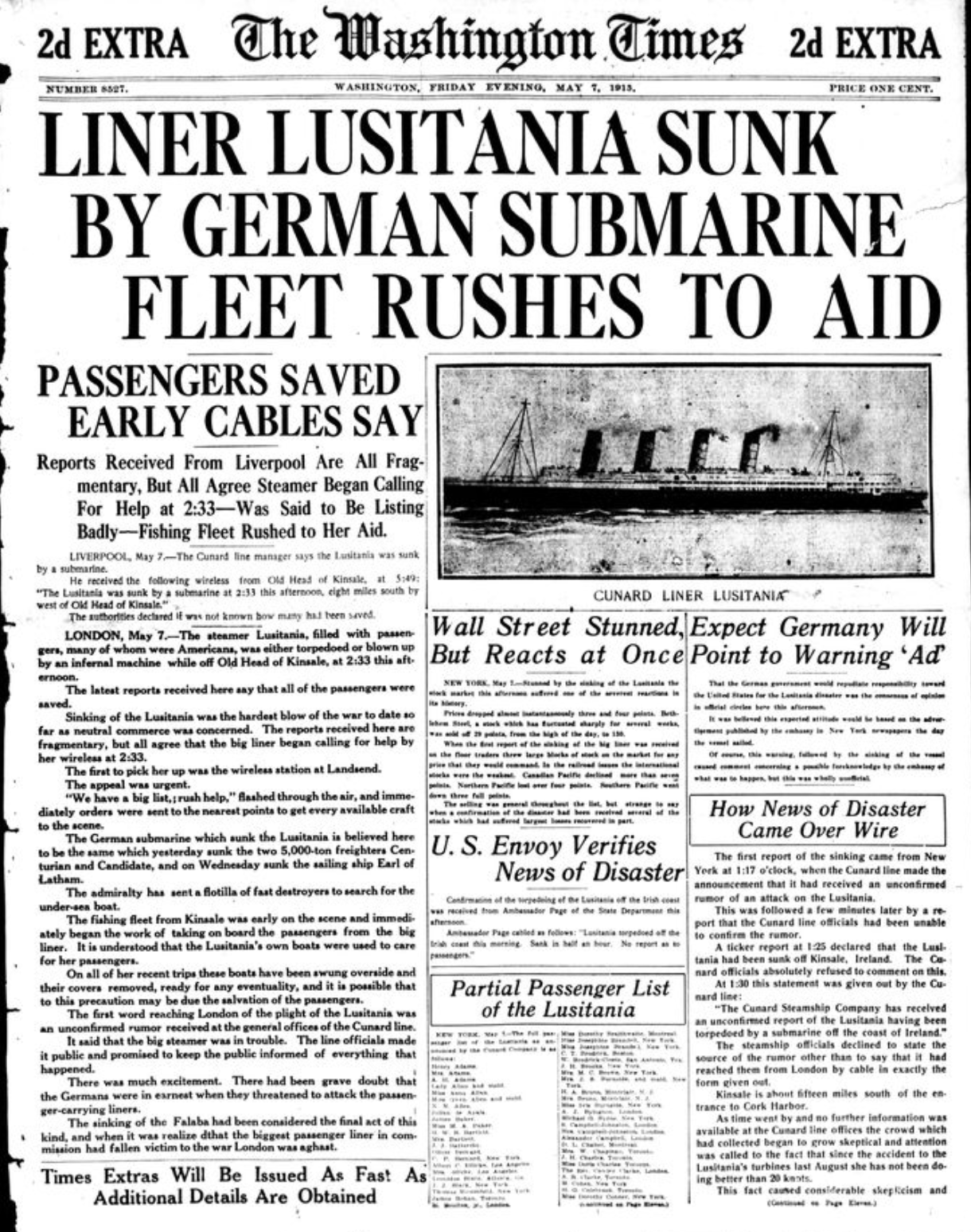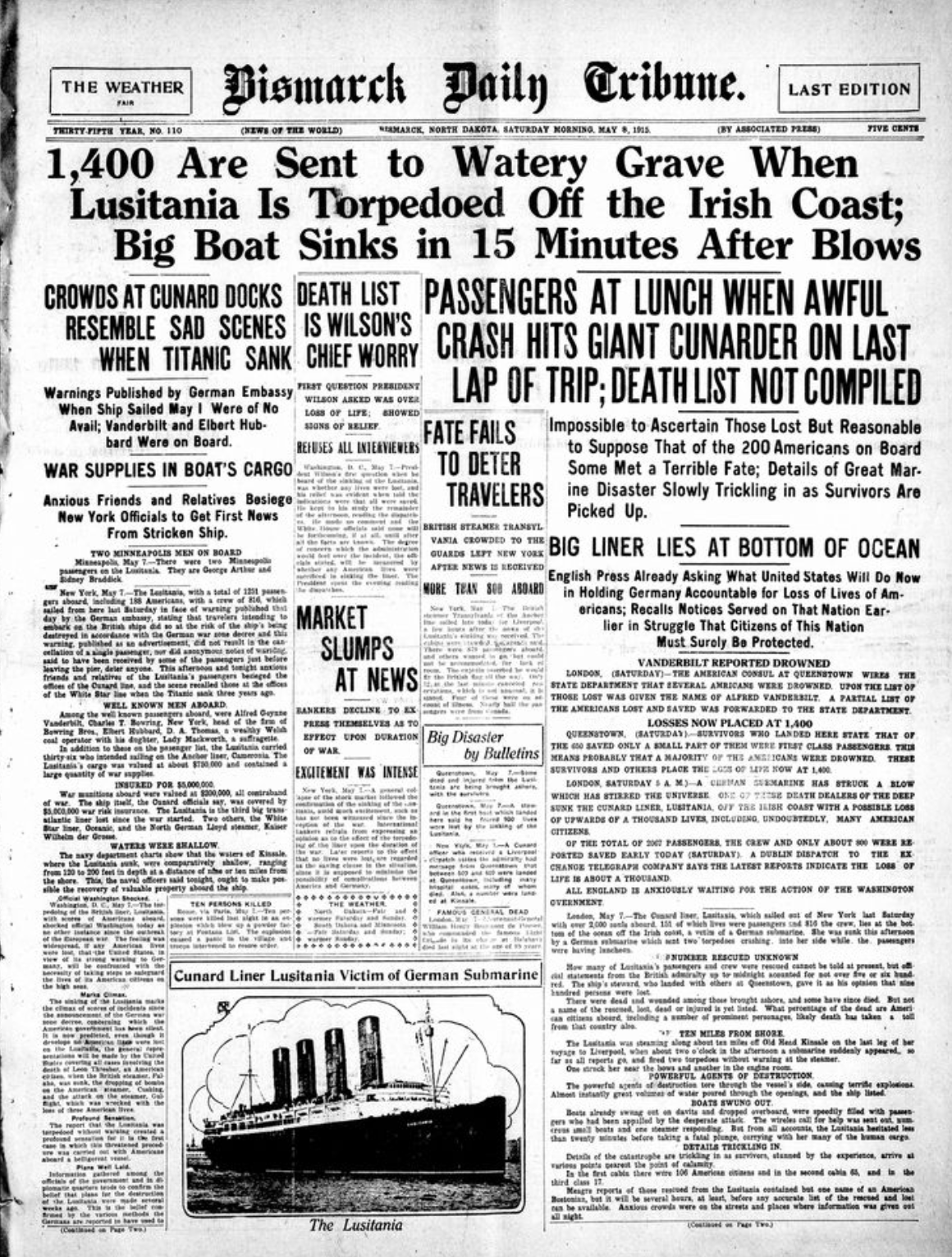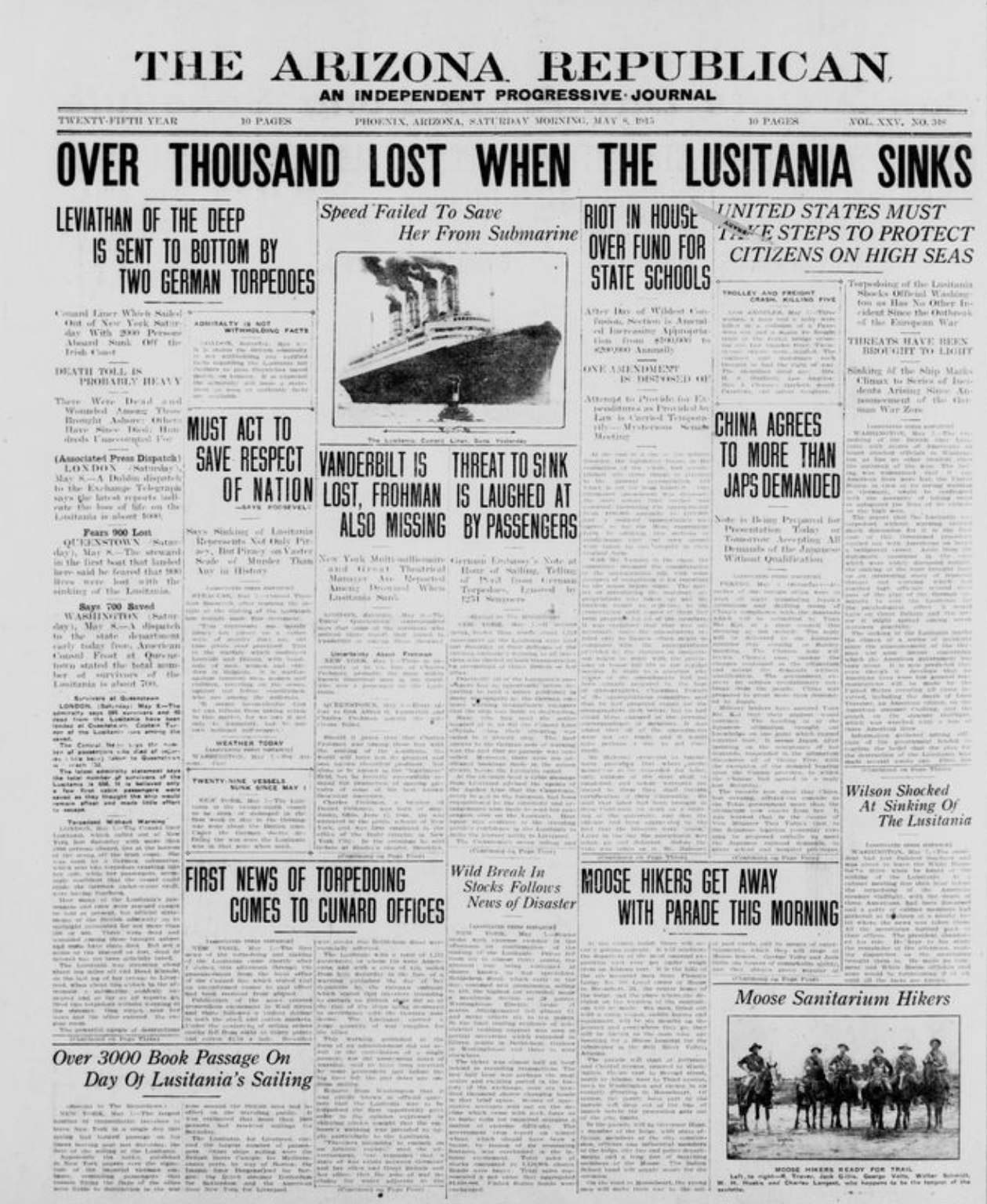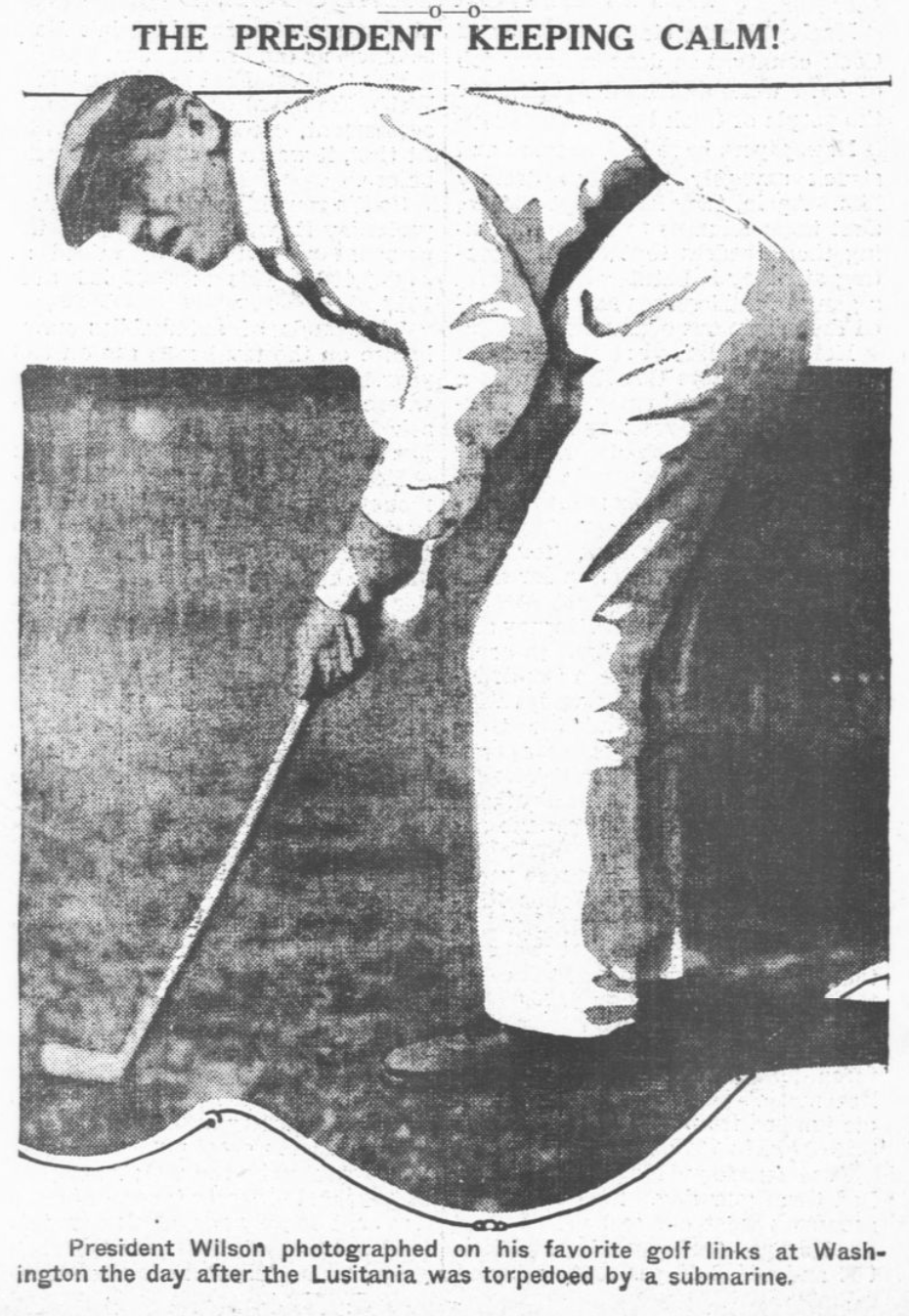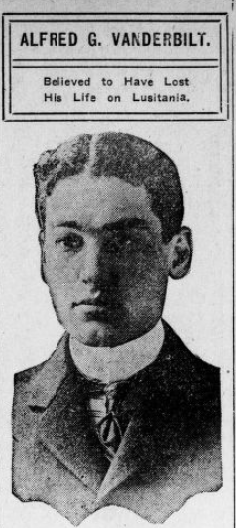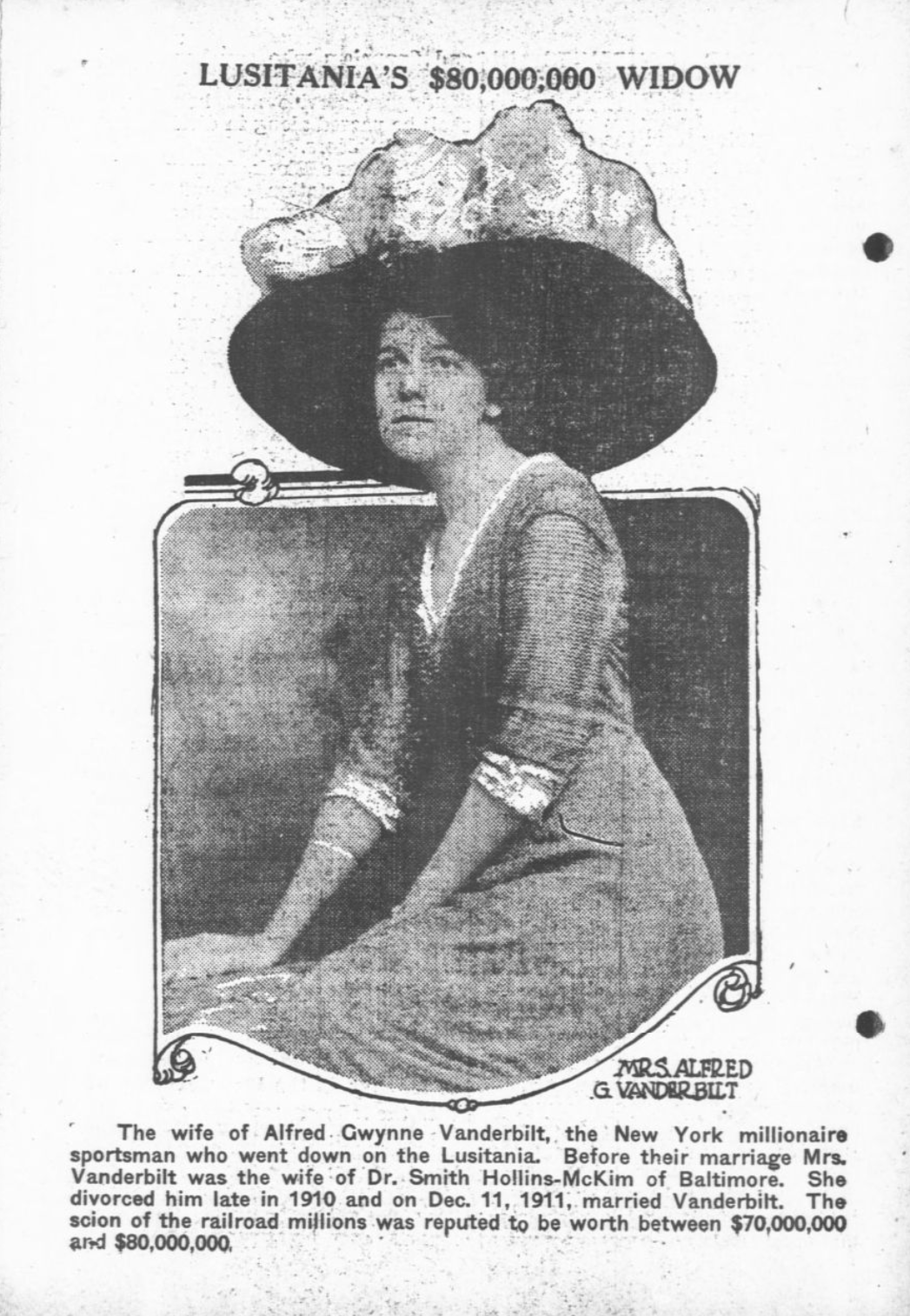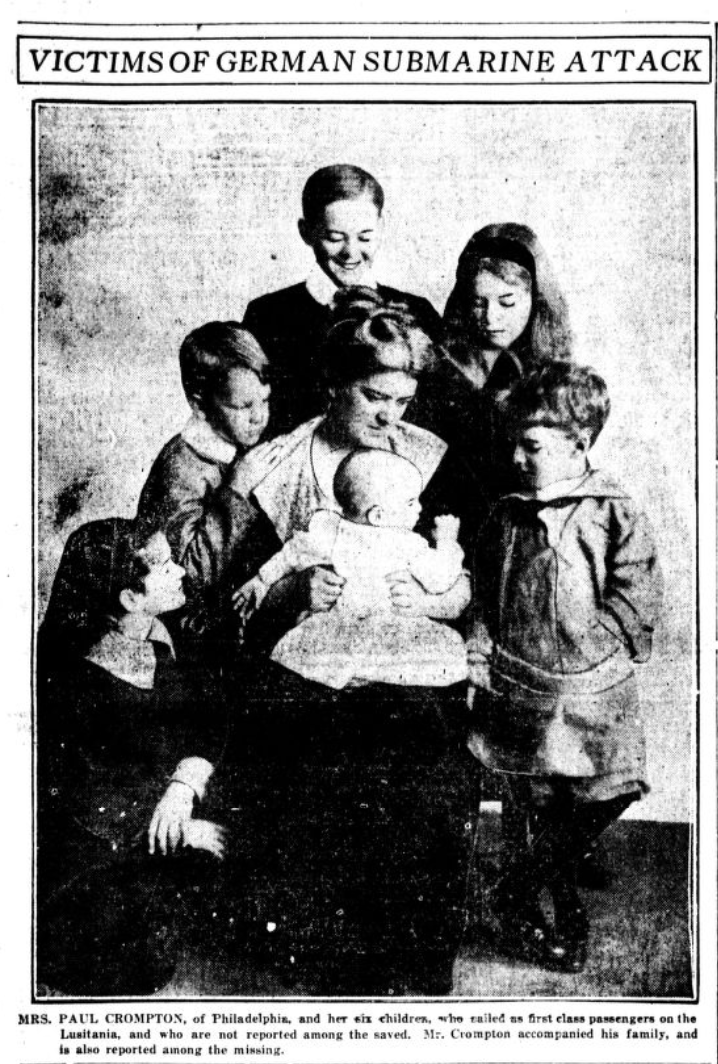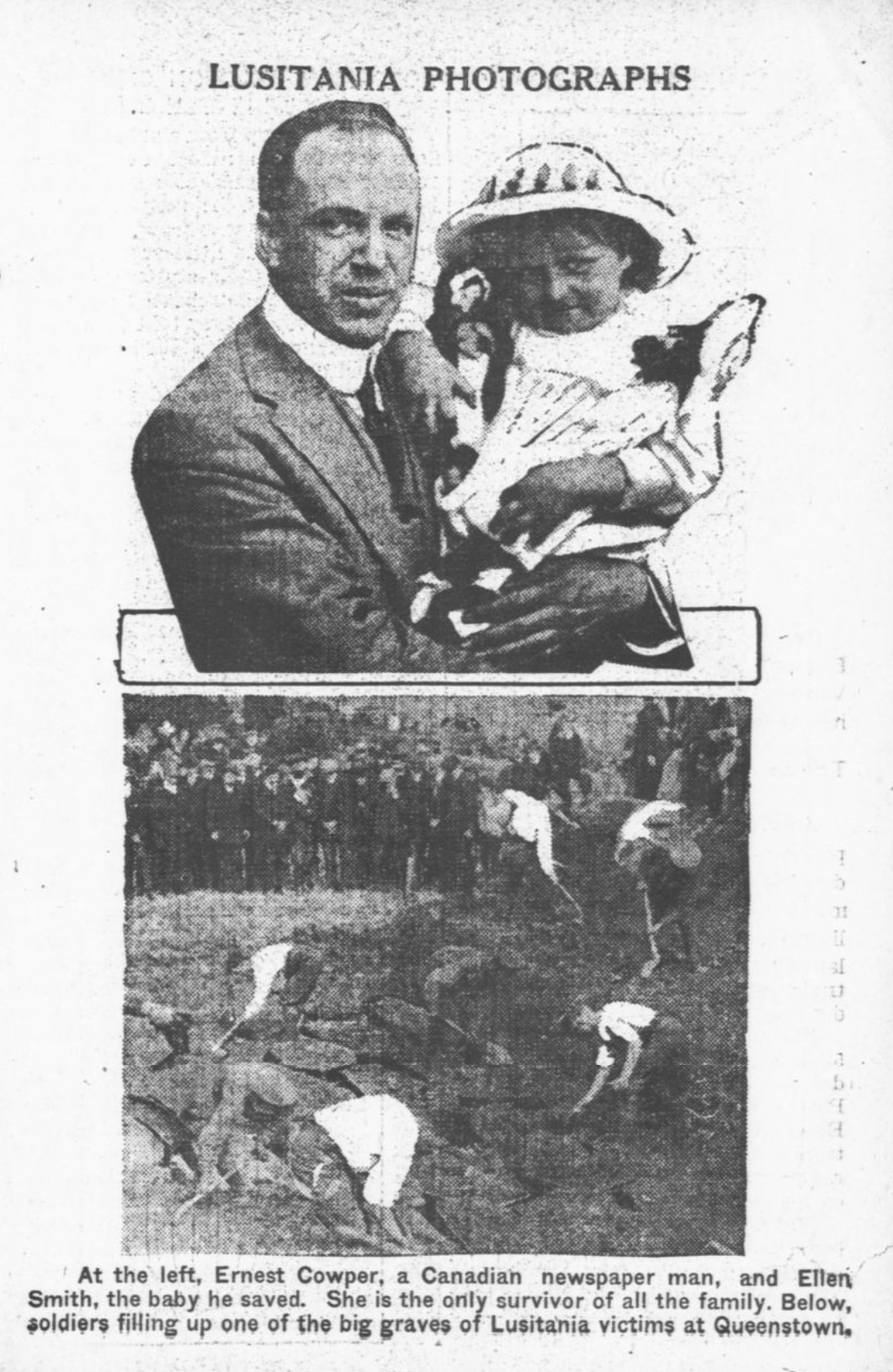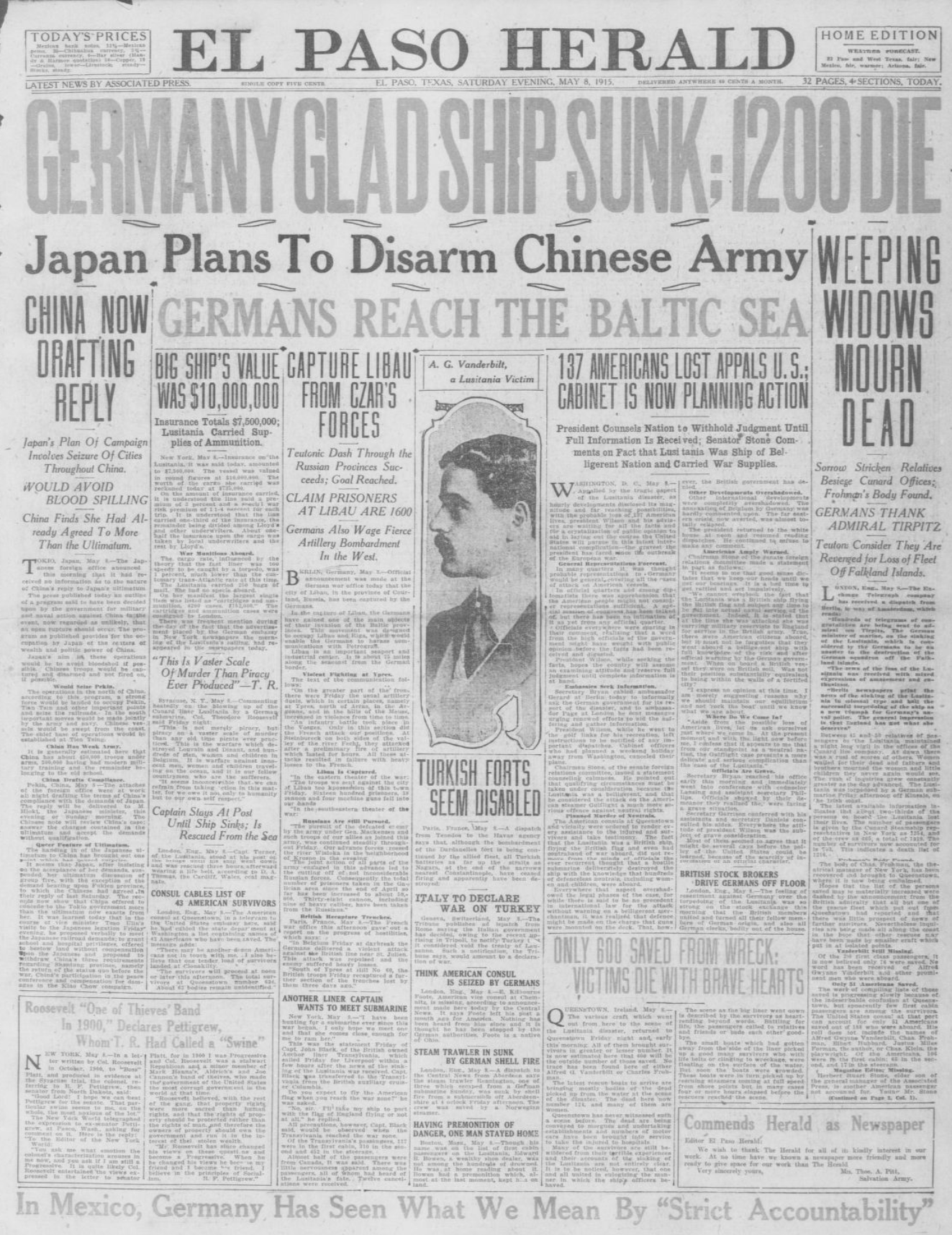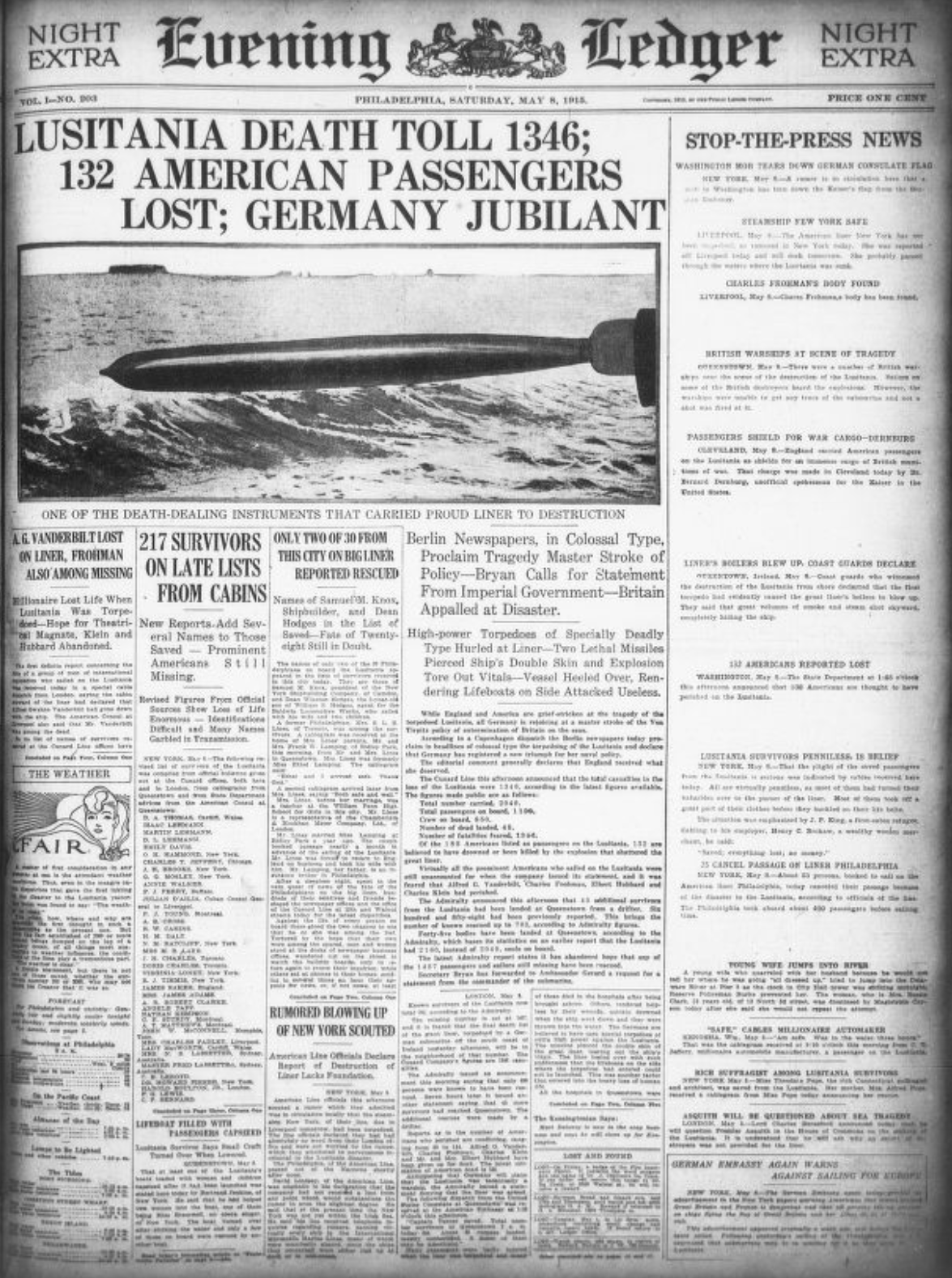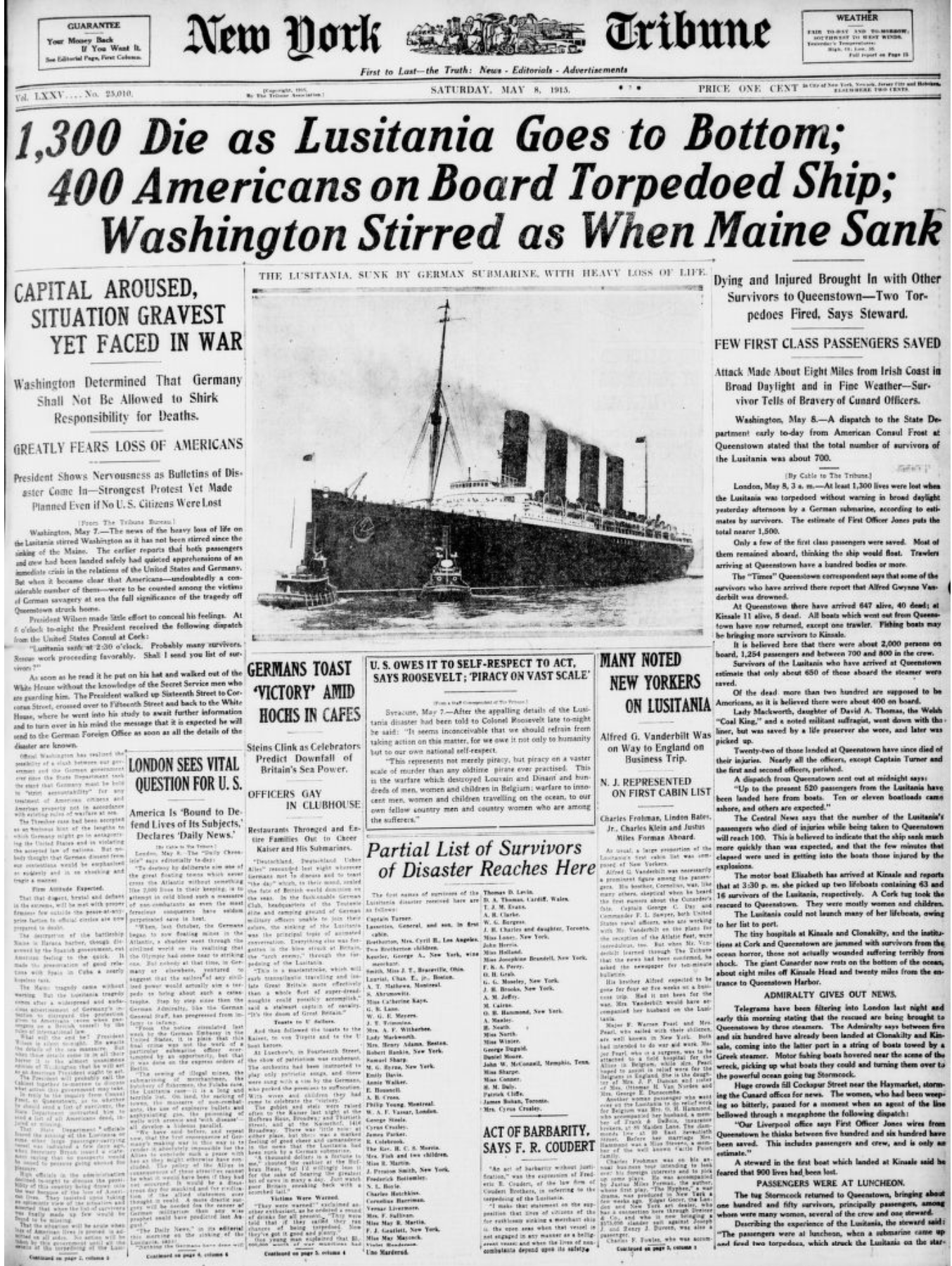How Americans Reacted to the Sinking of the RMS Luisitania
On this day in 1915, the British passenger steam ship RMS Lusitania sunk after being attacked by a German U-Boat. The luxury ocean liner was six days into its journey from New York to Liverpool when it was struck by two German torpedoes as the those aboard were having lunch. Within twenty minutes, it had sank just off the southern coast of Ireland, killing 1,195 out of the 1,960 passengers aboard.
Among the dead were around 130 Americans, leaving the American public reeling with shock. However, as horrified as they were, the American public were also captivated by the details of the disaster. The sinking of the Lusitania received such mass coverage and discussion amongst the American public that it is no wonder that it set off a chain of events that would eventually result in the United States joining the First World War two years laters.
Thanks to the Library of Congress, today we can access hundreds of digitized newspaper archives dating back over a hundred years ago to the days after the Lusitania tragedy in order to see firsthand how this disaster gripped the American public and thus how it eventually changed the course of American involvement in World War I.
In the days after the disaster, the fate of the Lusitania dominated the front pages of most American newspapers. Earlier that same month, many papers reported warnings that the German Embassy in Washington, DC had made against trans-Atlantic travel. In the immediate aftermath of the tragedy, these same warnings became the topic of nationwide reporting. The First World had begun just over a year earlier and seeing as the Lusitania was a British owned ship, the German government had issued a statement to all passengers seeking to cross the Atlantic warning that any “vessels flying the flag of Great Britain or of any of her allies are liable to destruction.”
It is evident from the journalism in the immediate aftermath of Lusitania’s sinking, that the messages from the German government were met with doubt by passengers and officials alike. Many did not believe that German forces would actually attack civilian targets while others believed that passengers would be allowed to disembark any targeted vessel prior to it being attacked. Tragically though, the sinking of the Lusitania proved just how serious the German warnings had been.
It was Friday morning in New York when news of the Lusitania tragedy began to reach the United States. Over the course of the weekend, newspapers from all over the country reported on the shocking and tragic details that surrounded the disaster. The following day, the morning edition of the Bismarck Daily Tribune in North Dakota noted how families were frantically searching for news of their loved ones. They compared the scene at the Cunard Line offices, the company that owned the Lusitania, to what had unfolded at the offices of the White Star line following the sinking of the Titanic three years prior.
Politically speaking, newspapers reported in the immediate aftermath that the Wilson administration would not be making any comment until all the facts of the disaster were known. One paper in Chicago, The Day Book, even published photos of Wilson golfing in the day after the tragedy with bold letters describing the image as “the president keeping calm!” However, this did not stop former presidents such as William Howard Taft and Teddy Roosevelt from speaking out on the tragedy. Taft’s comments were noted in the May 8, 1915 edition of Alaskan newspaper The Nome Daily Nugget as he called upon all nations neutral in the ongoing war to put pressure on the German government to cease its attacks at sea, referring to them as “piratical outages'' and calling the sinking of the Lusitania “an unwarranted outage for which no excuse can be found.”
On the same day, the statement made by Teddy Roosevelt was published in The Arizona Republican in Phoenix, Arizona. After learning about the tragedy, Roosevelt called for immediate action by the United States government and referred to the actions of the German military as “warfare against innocent, women, and children” as well as stating that “it seems inconceivable that we can refrain from taking action in this matter, for we owe it not only to humanity, but to our own national self-respect.”
The impact of the tragedy was immediately picked up on as several American newspapers, from the Harrisburg Telegraph of Pennsylvania to The Ogden Standard of Utah and many more inbetween, openly referred to the sinking of the Lusitania as the most serious event of the war for the United States. Papers across the country scoured the list of the survivors and noted those that were still missing, among them prominent Americans such as millionaire Alfred G. Vanderbilt, playwright Charles Klein, theatre manager Charles Frohman, philosopher Elbert Hubbard, and novelist Justus Miles Forman.
Although the German embassy in Washington, DC made no comment, the German government defended their actions by issuing claims that the Lusitania had weapons and other supplies for war amongst its cargo. An Associated Press dispatch out of Berlin made on May 8, 1915 was published in papers across the United States. This dispatch detailed how German officials had argued that all British merchant ships were well-known for carrying weapons and that the owners of the Lusitania knew the risk they were putting their passengers in by doing so.
In the months following the tragedy, multiple papers continued their coverage of the Lusitania by detailing the British inquiry into the causes of the disaster and publishing that, contrary to German claims, the British argued that the vessel had been unarmed at the time of the incident. Over two months after the incident, Philadelphia’s Evening Ledger reported that the British report had officially found that “no explosives were in cargo, as Germans charged” and that the assault on the Lusitania was “made with the purpose of taking lives.”
Not only did the sinking of the Lusitania undoubtedly put the United States on a collision course with Germany, it increased anti-German sentiment amongst the American public. This can be seen in how the incident was reported within American newspapers in the days, weeks, and months that followed. The Evening Ledger claimed in the immediate aftermath of the disaster that Germany was “jubilant” at the news, reporting that “while England and America are grief-stricken at the tragedy of the torpedoed Lusitania, all Germany is rejoicing.” The day after the sinking, The El Paso Herald of Texas published the headline “Germany glad ship sunk; 1200 die” on their front page. On the same day, the New York Tribune ran a front page story announcing that Germany was celebrating the tragedy stating that “steins clink as celebrators predict downfall of Britain’s sea power” as well as asserting that “restaurants thronged and entire families out to cheer Kaiser and his submarines.”
The anger felt by Americans towards Germany’s actions did not dissipate with time however. As the results of the British inquiry into the sinking became public in July 1915 and subsequently exonerated the Luisitania of the German accusations that it had been carrying weapons, American newspapers quickly ran stories detailing how the attack had been orchestrated with the explicit purpose of killing civilians. In a July edition of The Washington Herald the headline announcing the findings of the British inquiry was “toll of Luisitania victims laid to German murder lust” along with the subtitle “their aim to kill.”
Even though the United States did not enter the war officially until two years later, looking back at how the tragedy of the Luisitania was received shows us that it was ultimately the point of no return for American neutrality. The loss of American lives aboard a British vessel and thus the two nations sharing a tragedy at the hands of the German war effort served as the first push for the United States to enter the conflict on the side of Britain and her allies. The damage done to American-German relations by the Luisitania disaster essentially guaranteed that neutrality was no longer going to be a permanent option for the United States.

